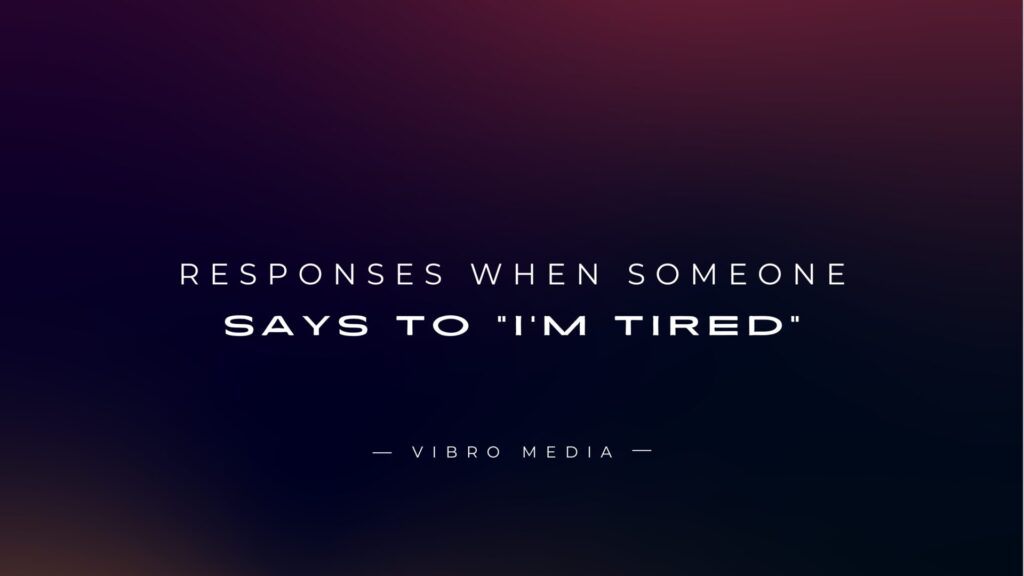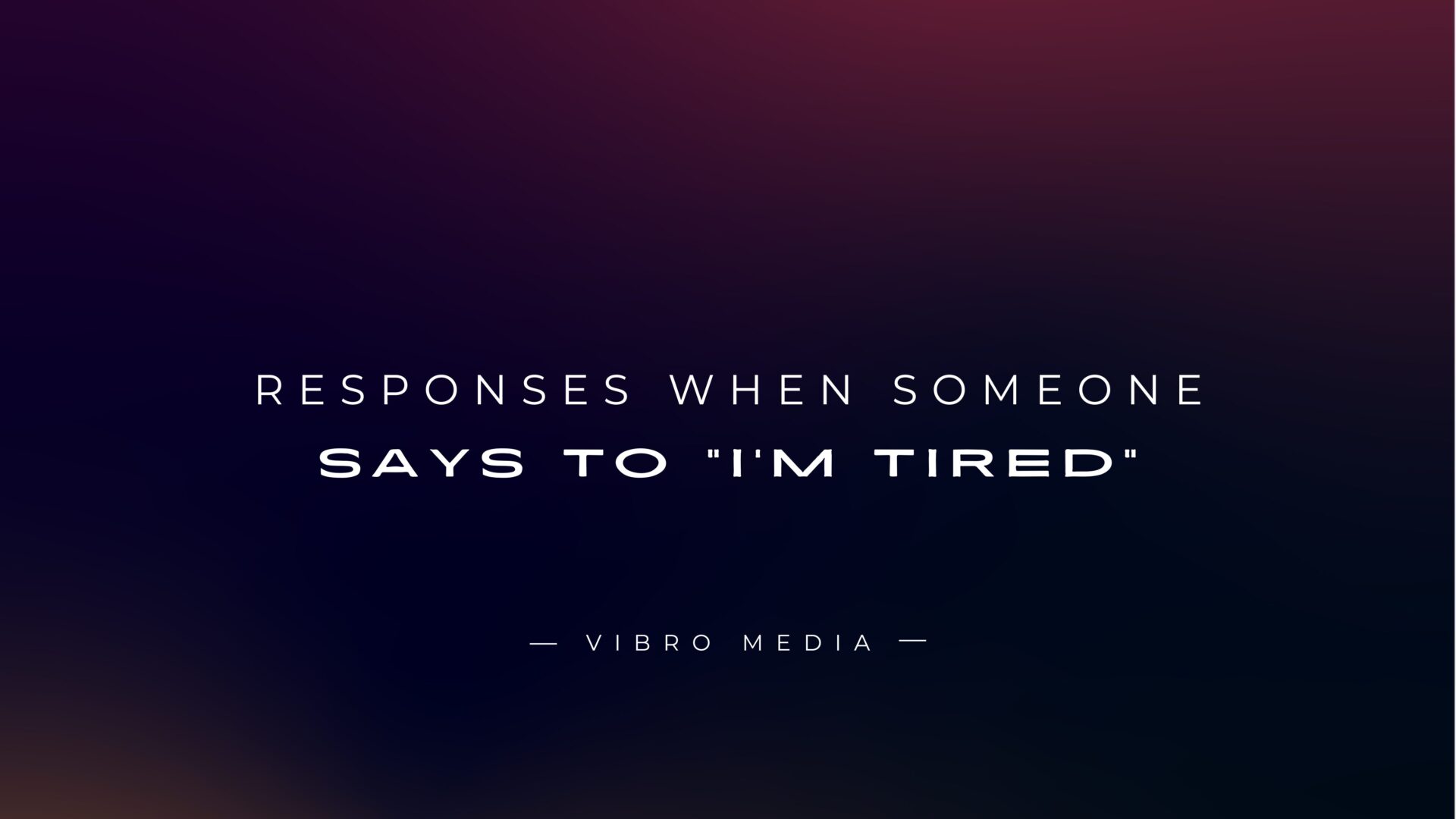We’ve all been there—either feeling the weight of exhaustion ourselves or hearing it from a friend, family member, or coworker. When someone tells you, “I’m Tired,” it can be a simple statement of physical exhaustion or a hint at something deeper. This article will explore how to respond compassionately and thoughtfully when someone shares their fatigue with you. We’ll cover everything from understanding different types of tiredness to practical responses.

200+ Responses When Someone Says To “I’m Tired”
Empathetic Responses
- I understand; it’s tough to feel that way.
- That sounds draining; I’m here for you.
- It’s okay to feel tired; it happens to all of us.
- You’ve been through a lot lately; feeling worn out is natural.
- I can see why you’d be feeling that way.
- Your feelings are completely valid; take your time.
- It must be exhausting; I appreciate you sharing that.
- It’s hard to keep going when you feel this way.
- I can’t imagine how tired you must feel.
- You’re not alone in feeling that; we all have those days.
Supportive/Encouraging Responses
- You’re doing so much; give yourself a break.
- Hang in there; you’re almost through it!
- Just remember to take care of yourself; you deserve it.
- You’re stronger than you realize; keep pushing through.
- It’s okay to take a moment for yourself; you’re doing great.
- You’ve got this! Rest if you need to, but keep moving forward.
- I believe in you; a little rest can make a big difference.
- Every step you take counts; don’t underestimate your progress.
- Just think about how far you’ve come; that’s impressive!
- You can overcome this; just take it one day at a time.
Offering Help
- Can I lighten your load?
- How about I handle some of your tasks for a bit?
- Do you want me to help you with anything specific?
- Let me know if there’s something I can take off your plate.
- Can I bring you some coffee or tea to help perk you up?
- Would it help if I joined you for a break or walk?
- How about I cook dinner tonight? You deserve to relax.
- If you need a listening ear, I’m here for you.
- Would you like me to help organize things for you?
- I can help you plan some downtime if you need it.
Suggesting Rest or Relaxation
- A quick power nap may help.
- How about you take a break and breathe for a bit?
- Have you thought about taking a day off?
- A little downtime might be just what you need.
- You deserve a relaxing evening; how about a movie?
- Some quiet time could recharge your batteries.
- Taking a short walk could help clear your mind.
- Why not listen to some calming music for a while?
- A warm bath could be soothing right now.
- Try to disconnect for a bit and enjoy some peace.
Humorous/Light-Hearted Responses
- Let’s schedule a ‘do nothing’ day together!
- You must have run a marathon in your mind!
- I get it; we need a nap championship!
- Sounds like you need a vacation… or just a nap!
- You know what they say—life is a marathon, not a sprint!
- Why don’t we both join a couch potato club?
- I hear coffee is great for reviving tired souls!
- Let’s make today a ‘no effort’ zone!
- Just remember, even superheroes need to recharge!
- I think you just need to switch to ‘low power mode!’
Sympathetic but Action-Oriented
- That sounds tough; let’s find a way to lighten your load.
- I can see how that would be tiring; let’s strategize.
- It’s important to address what’s wearing you out. What can we change?
- Let’s identify what’s draining your energy and tackle it together.
- Let’s brainstorm some ways to make things easier for yLet’szing you’re tired is the first step; let’s work on it.
- What can we prioritize to help you feel less overwhelmed?
- You’re not alone in this; let’s figure out a solution.
- It’s okay to seek help; let’s find a way to manage things better.
- Let’s set some manageable goals, so you don’t feel burdened.
Curious/Understanding Responses
- What do you think is making you feel so tired?
- Has something been particularly exhausting lately?
- Is it physical tiredness, or is your mind feeling drained?
- Are there specific tasks or activities wearing you out?
- How long have you been feeling this way?
- Is there anything in particular that’s been stressing you out?
- Do you think your sleep routine is affecting how you feel?
- What do you usually do to recharge when you’re feeling this way?
- Have you taken a break recently?
- Is there something you’ve been juggling that’s weighing you down?
Validating Their Feelings
- It’s completely normal to feel tired; you’re not alone.
- Your feelings are valid; everyone gets tired sometimes.
- It’s okay to admit that you need a break.
- Feeling tired is a sign that you’ve been working hard.
- It’s understandable to feel this way, given your circumstances.
- You’re not weak for feeling tired; it just means you’re human.
- Acknowledge that tiredness is a natural response.
- You’ve been pushing yourself; it’s okay to feel exhausted.
- Your body and mind are telling you something important.
- It’s alright to take a step back and recognize your limits.
Motivational Responses
- Just remember, rest is part of the journey to success!
- You’ve come so far; don’t forget to celebrate your progress!
- This is just a phase; you’ll bounce back stronger!
- Taking a break now will help you recharge for what’s ahead.
- Every day is a new opportunity; you’ll get through this!
- Think of how much you’ve accomplished; you’re doing great!
- You can do this! A little rest will make a big difference.
- Remember, even small steps forward are progress!
- You’ve faced challenges before; you can handle this, too!
- Keep pushing; you’re capable of achieving your goals!
Relating to Their Situation
- I completely understand; I felt that way last week.
- I’ve been there, too; it can be overwhelming.
- I know how tiring life can get; we all have those days.
- It’s tough when everything seems to pile up, isn’t it?
- I can relate; sometimes, it just feels like too much.
- You’re not alone; we all experience this at times.
- I get it; balancing everything can be exhausting.
- I felt drained after my busy week; it’s so relatable.
- Sometimes, life gets too heavy; I understand.
- We all have our moments of feeling completely wiped out.
Offering a Distraction
- How about we watch a funny movie to lighten the mood?
- Want to play a game or do something fun together?
- Let’s grab some ice cream; a treat could help!
- Let’s go for a walk and chat about something light.
- We could try cooking something new; that might be fun!
- Would you like to listen to a podcast or music together?
- Let’s take a quick drive and enjoy the scenery.
- Let’s plan a fun outing for the weekend.
- We could look up a funny video or meme to share a laugh!
- Let’s dive into a new book or show; it might help take your mind off things.
Gentle Humor (When Appropriate)
- Maybe you need a nap… or a vacation on a tropical island!
- Are you tired? I thought you were just saving your energy!
- Sounds like you’ve earned yourself a ‘do-nothing’ day!
- Maybe it’s time to start charging yourself overnight like a phone!
- You must be secretly training for the Tired Olympics!
- Let’s establish a ‘tired buddies’ club; we’ll meet for naps!
- You could always take a break and join me for a couch potato competition!
- Let’s just blame the weather; it always makes us feel sluggish!
- You know what they say: tired is just the new fabulous!
- If being tired were an Olympic sport, you’d win gold!
Encouraging Self-Care
- Make sure you’re taking time for yourself; it’s important.
- Self-care is essential; what do you like to do to relax?
- Have you thought about a relaxing bath or a spa day?
- Consider treating yourself to a quiet evening with a good book.
- Taking a day for yourself might be just what you need.
- Make sure to prioritize your well-being; you deserve it.
- What’s one self-care activity you enjoy that you can do today?
- Don’t forget to nourish yourself; eat something healthy!
- Allow yourself some guilt-free relaxation time; you’ve earned it!
- Self-care isn’t selfish; it’s necessary. What can you do for yourself today?
Reassuring Responses
- It’s okay to feel tired; we all go through it.
- You’re not alone in feeling this way; it happens to everyone.
- Rest is important, and it’s perfectly fine to take some time.
- You’re doing your best; it’s normal to feel fatigued sometimes.
- You can take a break; your health comes first.
- Remember, it’s okay to prioritize yourself; don’t hesitate.
- You’ve been working hard; it’s understandable to need a pause.
- It’s a sign that you’re human; everyone needs rest occasionally.
- You’re in a safe space to express your feelings; it’s valid.
- You’re handling a lot; it’s natural to feel worn out.
Expressing Concern
- I’m concerned about you; is there anything you want to discuss?
- Have you been feeling this way for a while? It’s important to check-in.
- I noticed you seem more tired than usual; is everything okay?
- I’m here if you need to vent or share what’s on your mind.
- Your well-being is important to me; let’s figure this out together.
- I care about how you’re feeling; do you want to chat?
- It’s okay to reach out if you’re feeling overwhelmed.
- If you need support or someone to listen, please let me know.
- I just want to make sure you’re taking care of yourself.
- Let’s discuss what might be causing your tiredness; I’m here to help.
Problem-Solving Approach
- What could help alleviate some of your tiredness?
- Let’s brainstorm ways to lighten your load; we can tackle it together.
- What changes can we make to your routine to help you feel better?
- Is there a specific task we can prioritize or delegate to others?
- Let’s identify the main stressors and see how to manage them.
- Could adjusting your schedule help you feel less overwhelmed?
- What would make your days feel less exhausting?
- Let’s look at your commitments and see if anything can be rearranged.
- How can I assist you in managing your time better?
- Let’s talk about setting some boundaries to protect your energy.
Mindfulness or Relaxation Suggestions
- Have you tried some deep breathing exercises? They can be calming.
- Mindful meditation for just a few minutes might help clear your mind.
- How about a quick yoga session to stretch and relax your muscles?
- Listening to calming sounds or nature sounds can help you unwind.
- Try taking a moment to close your eyes and just breathe deeply.
- A short mindfulness exercise could help ground you right now.
- How about stepping away for a moment to focus on your breath?
- Guided imagery can be relaxing; would you like to try it?
- Consider doing a body scan to check how you’re feeling physically.
- Taking a moment to reflect on what you’re grateful for can uplift your mood.
Acknowledging Mental or Emotional Fatigue
- It’s completely valid to feel mentally drained; emotions take a toll.
- I understand that mental fatigue can be just as exhausting as physical tiredness.
- Your feelings of overwhelm are real; it’s important to recognize that.
- It’s okay to acknowledge that you’re feeling emotionally exhausted.
- Mental fatigue can sneak up on you; have you been under a lot of stress?
- It’s understandable to feel weighed down by everything on your mind.
- Taking care of your emotional health is just as important as physical rest.
- You might benefit from some time to process everything you’re feeling.
- Recognizing your emotional fatigue is a great step toward self-care.
- It’s normal to feel mentally wiped out when life gets hectic.
Offering a Change of Scenery
- Let’s take a walk outside to get some fresh air.
- A change of scenery can help; would you like to go to a café?
- Let’s head to a park or somewhere peaceful for a bit.
- Sometimes, just stepping outside can helJustind.
- What do you thelpsut taking a short drive somewhere relaxing?
- A little adventure might benefit you; let’s explore a new place! a quick change ohelpsndings can help refresh your energy.
- Let’s sit somewhere different for a while; a new view might help.
- How about visiting a local museum or art gallery to switch things up?
- Let’s find a cozy spot to relax together and chat.
Suggesting Time Off or a Break
- It might be a good idea to take a day off to recharge.
- Have you considered scheduling some time for yourself?
- Taking a break could benefit you; you deserve it.
- What do you think about planning a short getaway?
- A mental health day might be just what you need.
- Consider taking the weekend for some much-needed downtime.
- You can always take a break if things feel too overwhelming.
- It’s important to listen to your body; rest is essential.
- How about planning a day just for self-care and relaxation?
- You deserve a break from the hustle; let’s figure out how to make that happen.
Understanding Why People Say “I’m Tired”
When someone says, “I’m Tired,” it’s important to understand that this statement has different layers. Not all tiredness is the same, and recognizing the type of fatigue someone is experiencing can help guide your response.
- Physical Fatigue
This is the most obvious form of tiredness. Physical fatigue happens when someone is physically drained, possibly from lack of sleep, overwork, or physical exertion. A common response might involve suggesting rest, but the real question is whether their lifestyle is allowing them enough downtime.
- Mental Fatigue
Mental fatigue occurs when someone is mentally overwhelmed, often from excessive cognitive tasks, problem-solving, or emotional stress. You can sense this type of fatigue in people juggling multiple responsibilities, such as work, school, or personal projects. They might need a break, but more importantly, they might need to unwind mentally.
- Emotional Fatigue
Emotional fatigue is often overlooked, but it’s just as taxing as the other forms. It occurs when someone is emotionally drained from dealing with difficult situations, such as relationship issues, financial stress, or grief. A nap doesn’t easily solve this type of fatigue—it requires emotional support and a safe space to express feelings.
Empathetic Responses to “I’m Tired”
- Why Empathy is Important
When someone tells you, “I’m Tired,” they might not be looking for a solution—they might just want to be heard. Empathy allows you to connect with them on a deeper level and offer emotional support without trying to “fix” the problem.
- How to Show Genuine Concern
Instead of jumping straight to advice, start by acknowledging their feelings. A simple, “I hear you, it sounds like you’ve been through a lot,” shows that you’re listening and that their fatigue matters to you.
Practical Ways to Support Someone Who Says “I’m Tired”
- Offering Help Without Overstepping
Sometimes, people don’t want help, but they might appreciate small gestures. Offering to take something off their plate—like running an errand or offering to handle a task—can be a considerate way to provide support. Just ensure you’re not overstepping by offering more than they’re comfortable with.
- Suggesting Practical Solutions
If the person seems open to solutions, you can suggest practical ways to relieve their tiredness. This could be recommending a relaxing weekend, a day off, or even giving them tips on better sleep hygiene. But remember, they may just want to vent, so don’t push advice if it’s not asked for.
When “I’m Tired” Could Be a Cry for Help
- Identifying Underlying Issues
Sometimes, “I’m Tired” is more than just about fatigue—it could be a way of masking deeper emotional or psychological distress, like anxiety or depression. If you sense that there’s more going on, gently encourage them to talk about what’s bothering them.
- Offering a Listening Ear
Often, the best thing you can do is simply listen. Let them talk without interrupting or offering advice. Sometimes, just having someone to vent to can make a huge difference in how they feel.
The Power of Active Listening
- What is Active Listening?
Active listening means fully concentrating on what the other person is saying rather than passively hearing it. It involves responding with understanding and making the person feel genuinely heard.
- How to Actively Listen When Someone is Tired
Ask follow-up questions to show you’re engaged, such as, “Is there anything specific making you feel this way?” or “Would it help to talk about what’s been on your mind?” This lets them know you’re invested in what they’re saying.
Simple Words of Encouragement
- Choosing the Right Words
When someone says, “I’m Tired,” words of encouragement can go a long way. Phrases like “You’re doing great,” or “You’ve got this, just take one step at a time” are simple yet powerful.
- Being Sincere and Uplifting
Don’t offer generic platitudes. Be specific and genuine in your praise, like, “I’ve seen how hard you’ve been working, and it’s okay to take a break.”
When It’s Best to Give Space
- Recognizing When Someone Needs Time Alone
Sometimes, the best response is no response at all. If the person seems irritable or withdrawn, they might need time to recharge. Respect their need for space without taking it personally.
- Balancing Support with Space
Offering support is important, but so is knowing when to back off. Let them know you’re available if they need you, but don’t push them to talk or take your advice if they’re not ready.
Responding to “I’m Tired” in a Professional Setting
- Appropriate Responses in the Workplace
In a professional setting, how you respond to “I’m tired” may need to be more restrained. Acknowledging their exhaustion without crossing professional boundaries is key. You might say, “I understand, is there anything I can do to assist?”
- Maintaining Professional Boundaries
While it’s good to be empathetic, ensure your response is appropriate for the workplace. Offer practical support, like assisting with workload, but avoid diving into personal territory unless you have a close relationship with the person.
How to Recognize Chronic Fatigue
- Signs of Chronic Fatigue
If someone consistently says they’re tired, it might be a sign of chronic fatigue syndrome or another underlying health issue. Symptoms can include persistent tiredness even after rest, difficulty concentrating, and physical pain. Encourage them to seek medical advice if you notice these signs.
- Encouraging Them to Seek Help
If you suspect their tiredness goes beyond normal fatigue, gently suggest they see a doctor or therapist. It’s important to frame this in a supportive way, like, “I care about your well-being, and maybe a doctor could help figure out why you’re feeling so worn out.”
How Not to Respond When Someone Says “I’m Tired”
- Common Mistakes to Avoid
Avoid saying things like, “I’m Tired too,” or, “You just need more sleep.” These responses can come off as dismissive and make the person feel like their exhaustion isn’t being taken seriously.
- Why Dismissing Their Feelings Hurts More Than Helps
Dismissing someone’s tiredness can make them feel invalidated and less likely to open up in the future. Even if their fatigue seems minor, it’s important to acknowledge their feelings as real and valid.
Responding to Loved Ones Who Often Say “I’m Tired”
- Dealing with Family and Close Friends
When a loved one frequently says they’re tired, it’s important to be patient and understanding. They might need extra emotional support, and knowing you’re there for them can be incredibly comforting.
- Building Emotional Support Systems
Help them create a support system, whether encouraging them to reach out to others or taking on a more active role yourself. Sometimes, just knowing someone is consistently there can help alleviate emotional fatigue.
Helping Someone Recharge Their Energy
- Encouraging rest
Suggest ways to recharge, like taking a break, going for a walk, or indulging in something they enjoy. Rest isn’t just about sleep; it’s also about mental and emotional relaxation.
- Sharing Healthy Energy-Boosting Habits
You could share healthy tips like staying hydrated, eating well, or practicing mindfulness to help them regain some energy without feeling overwhelmed.
Using Humor to Lighten the Mood
- When Humor is Appropriate
Sometimes, humor can be a great way to break the tension. A light-hearted joke or funny story can lift their spirits, but be mindful of the situation. Humor might not be appropriate if they’re in deep emotional or physical distress.
- How Humor Can Relieve Stress
When used at the right time, humor can be a great stress reliever. It can help people see things differently and remind them not to take everything so seriously.
Conclusion
In conclusion, knowing how to respond when someone says, “I’m Tired” can help foster deeper connections, whether you’re offering support, injecting a bit of humor, or showing understanding. With over 200 responses, you now have the perfect reply for any situation—whether it’s lighthearted, motivational, or empathetic. The next time someone expresses exhaustion, you’ll be ready to brighten their day. And if you’re looking for more creative ways to respond in conversations, be sure to
Check out our:
200+ Responses to “Roger That” Complete Guide
FAQs
Q. What if someone is always tired and won’t talk about it?
Sometimes, people don’t want to open up about their tiredness because it could be linked to deeper emotional issues. In this case, gently letting them know you’re available to listen when they’re ready can go a long way.
Q. How do I respond if I’m also feeling tired?
If you’re also feeling drained, it’s okay to acknowledge that while still offering support. You might say, “I’m feeling pretty tired too, but I’m here for you if you need to talk.”
Q. What if someone says they’re tired but refuses help?
Some people prefer to manage their fatigue on their own. If they decline your help, respect their decision, and let them know you’re available if they change their mind.
Q. How can I tell if “I’m tired” is covering up a bigger problem?
Suppose someone regularly expresses tiredness without improvement or shows signs of emotional distress. In that case, it might be time to gently ask if there’s something else going on that they’d like to talk about.
Q. What should I do if I’m tired and don’t know how to respond to others?
If you’re also feeling exhausted, taking care of yourself first is important. You can still offer support, but be honest about your limits and ensure you’re getting the rest you need, too.











Sky Scarlet Nice post. I learn something totally new and challenging on websites
GlobalBllog I just like the helpful information you provide in your articles
Fran Candelera I really like reading through a post that can make men and women think. Also, thank you for allowing me to comment!